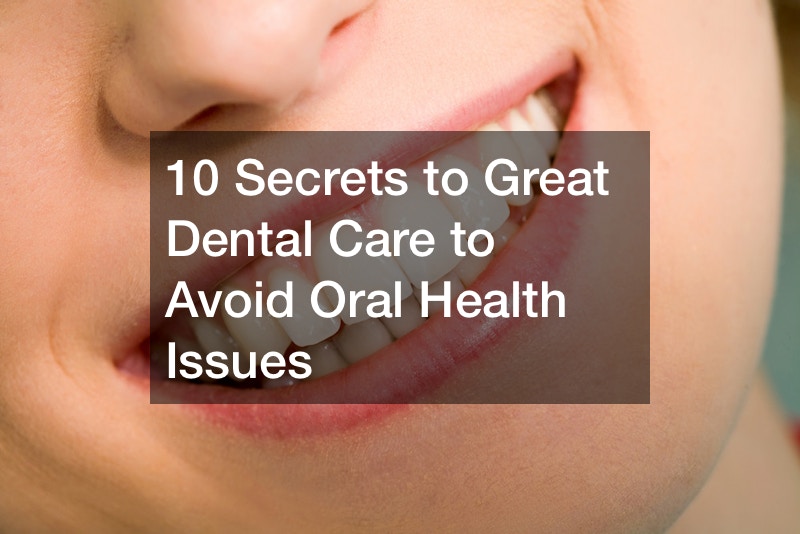
It’s mind blogging that, according to the World Health Organization, nearly 3.5 billion people suffer from oral diseases! While oral health issues are a global problem, did you know there are easy hacks to great dental care? Keep reading for a healthy dentition and an infectious smile. Let’s start!
1. Brush Your Teeth Before Retiring to Bed
You’ll be surprised that, according to Study Finds, 1 in 10 Americans never brush their teeth before bed. Moreover, another 10% admit to brushing their teeth at night twice to four times weekly! However, most dentists recommend brushing your teeth before bed for great dental care.
Let’s agree. You typically consume lots of food during the day. You may not know that tiny particles may get stuck between your teeth unnoticeably after consuming high-fiber foods. When this happens, the tiny particles will stay in your mouth, which attracts cavities, causing bacteria. Brushing your teeth before retiring clears out these food particles, keeping your dentition clean and healthy.
Typically, there’s a consistent building up of acid in your mouth. However, the acidity gets neutralized quickly thanks to the calcium in your saliva. However, your saliva production usually decreases while asleep, increasing the acidity levels. An acidic environment harbors bacteria that start eating your teeth. After brushing your teeth before bedtime, the fluoride in your mouth maintains the level of saliva, protecting your teeth from any bacterial damage.
Consistent brushing of your teeth every night prevents the building up of plaque (the yellowish substance that settles on your teeth, making them look unkempt). Plaque build-up can lead to the development of other dental issues when ignored. So, brushing your teeth at night will help you save money by avoiding any gentle dentist office visits.
2. Brush Your Teeth Properly

According to the National Library of Medicine, adults barely clean above 30-40% of their gingival margins while brushing their teeth. The stats show that you probably don’t brush your teeth effectively if you’re like most adults. So, how about learning to brush your teeth properly? If you need expert guidance, search for a dentist near me online for pro dental care cleaning services.
The proper teeth cleaning process begins with toothbrush selection. How’s the condition of your toothbrush? How are its bristles? A small-headed toothbrush with soft bristles will work fine.
After applying your fluoride toothpaste, you’ll need to hold the bristles near the gumline softly against the outside of your top teeth at a 45-degree upwards. Then, clean your teeth and gums softly using a circular motion or back-and-forth soft strokes. Ensure to clean spaces between your teeth using a sweeping motion. Repeat the same to the adjacent of your teeth and your bottom teeth, positioning your brush towards your gums at 45 degrees. Repeat to the inside top and bottom of your teeth.
To clean the chewing surfaces, hold the bristles flat against your molars. Clean the valleys and ridges of your top and bottom back teeth. Lastly, gently brush your tongue to freshen your breath and remove bacteria.
3. Always Use Flouride Toothpaste
Flouride is also known as ‘nature’s cavity fighter’ for good reasons. It’s a naturally occurring material that helps to prevent tooth decay by strengthening your teeth’s enamel (surface of your teeth). Typically, cavities are due to the bacteria inhabiting your mouth. It feeds on leftover food and fancies the sugary treats.
So, when the bacteria feed on sugars, it releases many acids. Now, this acid attacks your enamel, and before long, it damages the outer teeth’ protective layer, creating a conducive environment for tooth decay. The top secret to great dental care is fluoride.
Make fluoride your best friend. Fluoride is the number one enemy of tooth decay. It repairs the damage from the acids by a process known as remineralization, fighting cavities.
Flouride re-mineralizes the enamel and slows the demineralization process. Doing this reduces the small amounts of tooth decay in its initial stages. It also minimizes the risk of getting gum diseases by significantly reducing the amount of plaque in your mouth. Otherwise, you will need restorative dentistry service to smile confidently again.
4. Never Neglect Your Tongue

Did you know that the textured surface of your tongue allows it to collect and hold small particles and bacteria? Sadly, after a short period, the material build-up forms a multilayered biofilm on the surface of your tongue. Water and teeth brushing aren’t enough to go through the layer, nor sweep away the bacteria quickly. For this reason, cleaning your tongue is mandatory to achieve great dental care goals.
Let’s agree. Bacterial build-up in your mouth is never a good thing. Bacteria is a massive contributor to oral infections and dental carries among many conditions. So, if you don’t want to schedule an appointment with a cosmetic dentist, start cleaning your tongue first.
You’re probably unaware that your tongue can hold plenty of food remnants and dead skin. As a result, the combination is the usual culprit for your lousy breadth, especially during the morning hours. To control your foul breadth, you must make it a habit to scrap your tongue clean.
By cleaning your tongue, you’ll notice that you’ll enjoy a fresher mouth. Good tongue hygiene also improves your taste, meaning you’ll enjoy your food more! Also, it helps to remove any repulsive flavors from bacteria or old food particles.
5. Perfect Your Flossing Skills
According to News In Health, flossing and brushing may do a better job reducing plaque after one to three months than brushing only. The stats clearly say flossing is a great dental care hack you should never ignore. While your toothbrush typically cleans your teeth and gums, floss is an interdental cleaner that cleans the tight spaces between your teeth.
Flossing does a better job of removing stuck food particles between the intersection of your gums and teeth. When left alone, the trapped particles typically build plaque between your teeth. Over time, the plaque will harden to form tartar, which only a dentist can remove using a scrapper. When tartar isn’t treated, it will easily develop to become gum disease.
If you have dull teeth, consider flossing to brighten them up. Removing plaque from areas your toothbrush can’t reach will make your teeth brighter. However, for better and quicker results, use a tooth-whitening agent and commit to daily flossing and brushing your teeth twice with whitening toothpaste. Doing this will improve the appearance of your stained teeth.
6. Consider a Mouthwash
Alongside daily brushing, flossing, tongue cleaning, and overall dental hygiene, consider adding a mouthwash to your great dental care product list. The right mouthwash will protect your teeth from bacteria and help keep your breath fresh. Typically, the liquid nature of a mouthwash allows it to access areas that are impossible to reach using your toothbrush. Therefore, the deep penetration will kill bacteria in these inaccessible spaces. So, mouthwash helps to reduce potential oral problems by destroying the hiding bacteria.
While it’s true that a typical mouthwash contains ingredients that fight decay and cavities, a few go beyond that. They’ll help relieve pain and prevent the development of gum diseases through acid-induced erosion and controlling cavities. Most mouthwashes have hydrogen peroxide, which will help whiten your teeth. Also, using it consistently will help whiten your stained teeth. A typical mouthwash will contain non-abrasive technology that forms a protective shield while keeping your enamel healthy and preventing stains in the future.
7. Regular Dental Checkups
Let’s face it: most people will visit the dentist in case of an emergency dentistry case. However, if you desire a perfect dentition, you must be ready to do whatever it takes. It’s true that, according to the National Library of Medicine, approximately 36% of the population suffers from dental anxiety. However, you must decide to break the barrier and make it a habit to go for dental checkups.
Regular dental checkup is arguably the number one great dental care routine tip. Frequent visits can spot creeping concerns that could become more significant issues. For instance, a minor cavity can indicate that your gums aren’t in good shape and must be checked.
You may also find yourself in a situation with a decayed tooth needing a dentist’s attention. Most times, your only solution would be to pull it out. However, a dentist can give you reliable advice. For instance, depending on your situation, a dentist may advise on the ideal implant dentist for the best dental implants for your case. Also, they will advise on the best dental bridges that suit you well. Generally, regular visits to your dentist will help you keep a proper dentition and a healthy smile.
8. Drink Plenty of Water

It’s probably unknown to many, but drinking water is a great dental care tip to protect your teeth and gums. Alongside flossing and brushing, drinking water helps to prevent bacteria build-up and cavities. You can prevent the building up of plaque by simply taking water throughout the day.
Drinking water rinses food particles and bacteria from your mouth. Water helps fight gum diseases and cavities by keeping your mouth clean. Plaque can’t build up with a clean and hydrated mouth. Also, water helps to neutralize acidity levels in your mouth, which can harm your enamel. Additionally, a glass of water will wash away residues harboring bacteria that may cause you a foul breath, protecting your enamel.
Did you know that drinking water helps in remineralization? Typically, your enamel has more mineral content than your bones. For this reason, drinking water rich in trace minerals such as fluoride will help strengthen and restore your enamel. However, it’s essential to note that such minerals are typically found in tap and mineral water. So, filtered and bottled water lack the essential minerals. Even worse, reverse osmosis and distilled water have no fluoride and minerals.
Typically, a dry mouth (xerostomia) is a condition that enables plaque build-up, as the mouth will lack the capacity to produce ample saliva. Usually, saliva plays a significant role in protecting your teeth and gums. For this reason, it’s essential to keep yourself hydrated constantly.
9. Feast on Crunchy Fruits and Vegetables
Crunchy fruits and vegetables are great dental care tips for a healthy dentition. Typically, your crunchy veggies and fruits act as your natural toothbrush. Chewing on a carrot or an apple can help clear out any plaque that may stick to your teeth after dinner. So, this means you’ll be having a sweet treat, at the same time protecting your enamel.
If you have no quick access to your toothbrush, for instance, when in your office, don’t think you lack access to dental care. Simply munching on celery prevents the piling up of food particles in your mouth. Additionally, eating crunchy vegetables will stimulate your gums naturally. Hence, provoking your salivary glands to produce more saliva benefits your teeth and gums.
10. Cut on Sugar

It goes without saying. Bacteria in your mouth fancies sugars! If you aren’t aware, the sugars in your drinks and food are major contributors to dental carries. Typically, the bacteria in your mouth will use the sugars as a source of energy. As a result, they release acid as their waste product.
Acid is your enamel’s greatest enemy. It dissolves gradually, increasing your chances of developing dental oral health conditions. For this reason, if you want to prevent tooth decay and maintain a healthy smile, don’t hesitate to cut on sugar. Sugars are generally your greatest risk to achieving a great dental care plan. Even so, brush and floss your teeth regularly as you watch what you eat.
Maintaining a great dental care plan and avoiding oral health diseases is now possible. However, it would be best to put on the work. Brush your teeth regularly (especially at night), improve your flossing game, use your mouthwash regularly, cut on sugar, and make it a habit to eat crunchy fruits and vegetables. Also, make a habit to visit your dentist regularly for a checkup. Please check our website to learn more about dental services.





